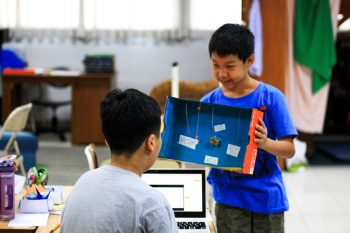We celebrated our love of science at #baisedu this week on Social Media. We asked our science teachers to answer some questions about what science at BAIS meant to them, and it showed how much they love science too!
Why do you love teaching science?
I love teaching science because I love learning science! I love teaching science because it helps my students learn to look at the world with wonder. God gave us an incredible place to live and science helps us to understand our world, and worship it’s creator! I also love that anyone can do science, all you need to do is ask, “Why?” and then try to find out! It’s so good for our brains to think that way. – Ms. Ribbens (3rd Grade Teacher)

Why do your students love to study science?
Our science curriculum includes many engaging and hands-on experiments that excite students. Students begin the units by asking questions and then spend time trying to find the answers to their many questions in science class. Studying science helps answer many of the students’ curiosities, it’s fun, and it gives meaning to the world around us. -Mrs. Nainggolan (1st Grade Teacher)

What is the most important thing students learn in science class?
I think the most important thing that students learn in science class is how to do the process of science. This is kind of like the scientific method, but it’s one thing to memorize a list and a whole other to do the process of science– to make hypotheses, test variables and analyze the results, and evaluate the meaning of those results. Knowing how to do this has a lasting impact throughout one’s life. When you are studying in college, when you are parenting children, when you are cooking, when you are reading or watching the news, knowing the process of science helps you take in the information presented to you and make sense of it. Even faith can be viewed through the lens of the process of science. C.S. Lewis logically hypothesized that Jesus could only be one of three things: a liar, a lunatic, or the real deal: God made flesh, Immanuel. Evidence, the data, overwhelmingly points to the latter. Not only is knowing how to do the process of science helpful in daily life, it is a tool that enables us to sort out what we believe and why. -Ms. D (Secondary Science Teacher)

What is the most exciting science event, experiment, discovery you’ve experienced?
Just a few months ago when I read in the paper about a newly discovered chemical element named Tennessine. A few years ago I’d heard a friend of mine talk about it, and how he’d been researching it alongside some labs in Russia and such and at the time I thought little of it. I just thought that a lot of people must be working on discovering new elements. But when I read about it in the papers, it was headlined like it was the coolest thing to happen to the Periodic Table since Rutherford. Knowing a guy to make a big discovery like a new element is pretty cool, and made me realize just how close to the next big discovery each of us can be. – Mr. Ernsburger (Secondary Science Teacher)

What is your favorite subject or unit to teach in science and why?
My favorite unit to teach is matter, because it matters! Everything is made of matter, without it we just wouldn’t be! It also poses the question, what form of matter is God? The kids also love exploring using ALL of their senses, including the taste! -Ms. Harvey (2nd Grade Teacher)






